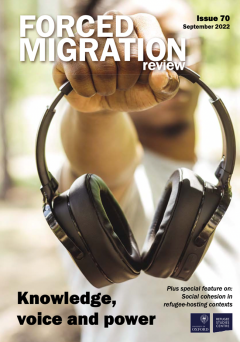
On Wednesday, 28 September 2022, more than 110 participants from 20 countries came together for the online launch of Forced Migration Review (FMR)’s 70th Issue on Knowledge, Voice, and Power. This special issue is published by Forced Migration Review at the Refugee Studies Centre, Oxford University, in partnership with the Local Engagement Refugee Research Network (LERRN) at Carleton University funded by the Social Sciences and Humanities Research Council of Canada (SSHRC), and with funding from the International Development Research Centre of the Government of Canada (IDRC). The full issue is available in English here, and soon in French, Spanish and Arabic.
The event was kicked off with the welcome address delivered by LERRN partner James Milner and IDRC representative Roula El-Rifai. James Milner emphasized the importance of localization in refugee studies and the meaningful participation of refugees in research, policy, and practice. Ensuring sustainable pathways to inclusive participation not only produces new forms of knowledge but also creates opportunities to shift power dynamics. Roula El-Rifai highlighted the IDRC’s unique contribution to refugee research, which supports twelve research chairs on forced displacement in twelve universities and six regions globally in order to establish an ecosystem approach to localized knowledge production, while also reminding the audience that 85% of the research on forced displacement is still produced in the Global North.
After the welcome address from LERRN and IDRC, Cory Rogers introduced the special feature of FMR 70 on social cohesion in refugee-hosting communities. Social cohesion, also referred to as peaceful coexistence or reconciliation programming, relates to the promotion of trust, social belonging, economic inclusion, and political participation in refugee-hosting contexts.
Next Olivia Berthon, one of the FMR 70 editors, provided an overview of the key themes that are discussed in the special issue while specifically drawing attention to one overarching theme: the need for meaningful inclusion of refugee voices for equitable actions. Some concerns that are addressed in the journal range from the exclusion of refugee voices in academia and decision-making processes to advocating for the youth with the lived experience of forced displacement and systemic bias against refugees.
The author panel, moderated by James Milner, highlighted five authors who shared some of the key takeaways from their articles published in FMR 70. Firstly, Rossmary Marquez Lameda stressed the funding, credibility, and visibility challenges that academics from the Global South face when they are conducting research on the Venezuelan displacement. Drawing from the research participants’ and their own personal experiences, Asma Rabi, Noor Ullah, and Rebecca Daltry analyze the local and international barriers that exclude Afghan refugees’ participation in and access to decision-making processes within the context of Pakistan.
Next, Lilian Obiye presented the key takeaways from her article which showcases the positive influence of refugee participation in the development of laws and policies in Kenya. Obiye proves that public participation and interaction with policymakers is an influential tool for the empowerment of refugees in Kenya. On the other hand, Bahati Kanyamanza, along with his co-author Emily Arnold-Fernandez, calls for a diverse and equitable representation for refugees at all levels of governance, starting with UNHCR’s Executive Committee (ExCom). The co-authors’ proposal for inclusive representation also introduces valuable recommendations for the selection criteria of refugee representatives who would comprise 50% of UNHCR’s ExCom. Finally, Aleksejs Ivashuk addresses the lack of awareness around statelessness and its effects on over ten million people worldwide. Ivashuk stresses that every international project, organization, and media should raise awareness of this issue to prompt a meaningful impact on the lives of stateless people.
At the end of the author panel, questions from the participants pointed out some examples of substantive change with a special emphasis on the role of education. Finally, the authors advised researchers who would like to publish their work to not be afraid and share their works with collaborators, mentors, and editors.